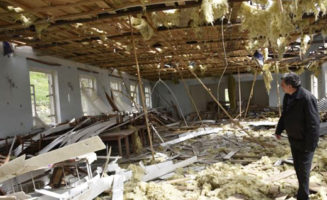By Ani Mejlumyan
YEREVAN — Armenia’s parliament has established a commission to investigate the circumstances of the 2016 “April War” with Azerbaijan. The move comes amid a widening battle against the country’s former authorities and their allies who continue to govern Nagorno-Karabakh.
Prime Minister Nikol Pashinyan announced the formation of the commission on May 20. “The time has come […] to get answers to a number of questions that are of concern to us all,” he said.
Pashinyan did not specify what questions would be probed. But suspicions have long swirled around the event, a four-day spurt of violence in 2016 that was the worst fighting between Armenian and Azerbaijani forces over Nagorno-Karabakh since a ceasefire was signed in 1994. It was also the first time that the Armenian side lost territory since the ceasefire, and raised concerns in Yerevan and Stepanakert about the ability of their armed forces to counter an aggressively growing Azerbaijani military.
After the clashes, there were reports of a lack of weapons and allegations that the political leadership in Yerevan – possibly by request from Moscow – told military commanders to halt their offensive even when they had the advantage.
“The commission can at least clear up some basic facts, for example how many soldiers were killed and when, but of course I am not sure this is the point of this commission,” Emil Sanamyan, a Washington, DC-based Armenia analyst, told Eurasianet. “The point is to discipline Serzh and Bako,” he said, referring to Serzh Sargsyan, the former leader of Armenia whom Pashinyan ousted last year, and Bako Sahakyan, the de facto leader of Nagorno-Karabakh and a Sargsyan political ally.








